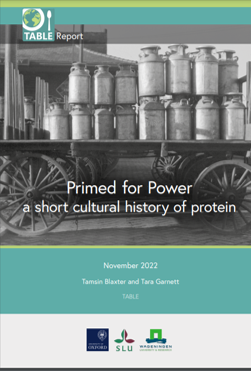Protein has a singularly prominent place in discussions about food. It symbolises fitness, strength and masculinity, motherhood and care. It is the preferred macronutrient of affluence and education, the mark of a conscientious diet in wealthy countries and of wealth and success elsewhere. Through its association with livestock it stands for pastoral beauty and tradition. It is the high-tech food of science fiction, and in discussions of changing agricultural systems it is the pivotal nutrient around which good and bad futures revolve. There is no denying that we need protein and that engaging with how we produce and consume it is a crucial part of our response to the environmental crises.
But discussions of these issues are affected by their cultural context—shaped by the power of protein. Given this, we argue that it is vital to map that cultural power and understand its origins. This paper explores the history of nutritional science and international development in the Global North with a focus on describing how protein gained its cultural meanings. Starting in the first half of the 19th century and running until the mid-1970s, it covers two previous periods when protein rose to singular prominence in food discourse: in the nutritional science of the late-19th century, and in international development in the post-war era. Many parallels emerge, both between these two eras and in comparison with the present day. We hope that this will help to illuminate where and why the symbolism and story of protein outpace the science—and so feed more nuanced dialogue about the future of food.


